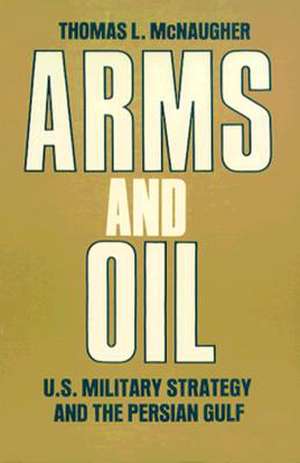Arms and Oil: U.S. Military Strategy and the Persian Gulf
Autor Thomas L. McNaugheren Limba Engleză Paperback – apr 1985
In 1979, after a decade of enormous increases in the price of oil, U.S. influence in the oil-rich Persian Gulf region declined sharply. Early in the year the Iranian revolution replaced the shah, the principal pro-American leader in the region, with rulers hostile to the United States and to its remaining friends around the Gulf. In December Soviet troops moved into Afghanistan, bringing the Soviets closer to the Gulf and the Indian Ocean. In the United States these events spurred the announcement of the Carter Doctrine and the creation of a new military command to handle Gulf crises. Yet the United States established no new fighting forces, and U.S. friends around the Gulf proved less willing than the shah of Iran to host a U.S. military presence. Thus debate has continued about whether and how the United States can secure important interests in the Gulf region.
In this book Thomas L. McNaugher offers a military strategy that integrates U.S. forces into the security framework that already exists in the region. He suggests that the United States should encourage Jordan, Pakistan, Great Britain, and others to continue their historical involvement in Gulf security, especially in such areas as internal security where U.S. forces are no better equipped than theirs and where U.S. participation may undermine the legitimacy of local rulers. In turn, the United States should focus on protecting the oil-rich states of the Arabian peninsula from external attack and on deterring further Soviet encroachment in the region. These missions demand an increase in the agility, rather than the size, of U.S. forces. But the more important requirement, McNaugher argues, is for skillfully blending U.S. military strategy into a diplomacy that exploits, rather than needlessly upsets, regional security mechanisms.
In this book Thomas L. McNaugher offers a military strategy that integrates U.S. forces into the security framework that already exists in the region. He suggests that the United States should encourage Jordan, Pakistan, Great Britain, and others to continue their historical involvement in Gulf security, especially in such areas as internal security where U.S. forces are no better equipped than theirs and where U.S. participation may undermine the legitimacy of local rulers. In turn, the United States should focus on protecting the oil-rich states of the Arabian peninsula from external attack and on deterring further Soviet encroachment in the region. These missions demand an increase in the agility, rather than the size, of U.S. forces. But the more important requirement, McNaugher argues, is for skillfully blending U.S. military strategy into a diplomacy that exploits, rather than needlessly upsets, regional security mechanisms.
Preț: 198.51 lei
Nou
Puncte Express: 298
Preț estimativ în valută:
37.99€ • 41.25$ • 31.91£
37.99€ • 41.25$ • 31.91£
Carte tipărită la comandă
Livrare economică 22 aprilie-06 mai
Preluare comenzi: 021 569.72.76
Specificații
ISBN-13: 9780815756231
ISBN-10: 0815756232
Pagini: 210
Dimensiuni: 152 x 229 x 16 mm
Greutate: 0.33 kg
Editura: Brookings Institution Press
Colecția Brookings Institution Press
ISBN-10: 0815756232
Pagini: 210
Dimensiuni: 152 x 229 x 16 mm
Greutate: 0.33 kg
Editura: Brookings Institution Press
Colecția Brookings Institution Press
Notă biografică
Thomas L. McNaugher is a research associate in the Foreign Policy Studies program at the Brookings Institution.
Descriere
In 1979, after a decade of enormous increases in the price of oil, U.S. influence in the oil-rich Persian Gulf region declined sharply. Early in the year the Iranian revolution replaced the shah, the principal pro-American leader in the region, with rulers hostile to the United States and to its remaining friends around the Gulf. In December Soviet troops moved into Afghanistan, bringing the Soviets closer to the Gulf and the Indian Ocean. In the United States these events spurred the announcement of the Carter Doctrine and the creation of a new military command to handle Gulf crises. Yet the United States established no new fighting forces, and U.S. friends around the Gulf proved less willing than the shah of Iran to host a U.S. military presence. Thus debate has continued about whether and how the United States can secure important interests in the Gulf region.
In this book Thomas L. McNaugher offers a military strategy that integrates U.S. forces into the security framework that already exists in the region. He suggests that the United States should encourage Jordan, Pakistan, Great Britain, and others to continue their historical involvement in Gulf security, especially in such areas as internal security where U.S. forces are no better equipped than theirs and where U.S. participation may undermine the legitimacy of local rulers. In turn, the United States should focus on protecting the oil-rich states of the Arabian peninsula from external attack and on deterring further Soviet encroachment in the region. These missions demand an increase in the agility, rather than the size, of U.S. forces. But the more important requirement, McNaugher argues, is for skillfully blending U.S. military strategy into a diplomacy that exploits, rather than needlessly upsets, regional security mechanisms.
In this book Thomas L. McNaugher offers a military strategy that integrates U.S. forces into the security framework that already exists in the region. He suggests that the United States should encourage Jordan, Pakistan, Great Britain, and others to continue their historical involvement in Gulf security, especially in such areas as internal security where U.S. forces are no better equipped than theirs and where U.S. participation may undermine the legitimacy of local rulers. In turn, the United States should focus on protecting the oil-rich states of the Arabian peninsula from external attack and on deterring further Soviet encroachment in the region. These missions demand an increase in the agility, rather than the size, of U.S. forces. But the more important requirement, McNaugher argues, is for skillfully blending U.S. military strategy into a diplomacy that exploits, rather than needlessly upsets, regional security mechanisms.
